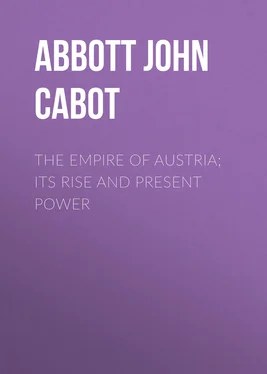John Abbott - The Empire of Austria; Its Rise and Present Power
Здесь есть возможность читать онлайн «John Abbott - The Empire of Austria; Its Rise and Present Power» — ознакомительный отрывок электронной книги совершенно бесплатно, а после прочтения отрывка купить полную версию. В некоторых случаях можно слушать аудио, скачать через торрент в формате fb2 и присутствует краткое содержание. Жанр: Путешествия и география, История, foreign_edu, foreign_antique, foreign_prose, на английском языке. Описание произведения, (предисловие) а так же отзывы посетителей доступны на портале библиотеки ЛибКат.
- Название:The Empire of Austria; Its Rise and Present Power
- Автор:
- Жанр:
- Год:неизвестен
- ISBN:нет данных
- Рейтинг книги:3 / 5. Голосов: 1
-
Избранное:Добавить в избранное
- Отзывы:
-
Ваша оценка:
- 60
- 1
- 2
- 3
- 4
- 5
The Empire of Austria; Its Rise and Present Power: краткое содержание, описание и аннотация
Предлагаем к чтению аннотацию, описание, краткое содержание или предисловие (зависит от того, что написал сам автор книги «The Empire of Austria; Its Rise and Present Power»). Если вы не нашли необходимую информацию о книге — напишите в комментариях, мы постараемся отыскать её.
The Empire of Austria; Its Rise and Present Power — читать онлайн ознакомительный отрывок
Ниже представлен текст книги, разбитый по страницам. Система сохранения места последней прочитанной страницы, позволяет с удобством читать онлайн бесплатно книгу «The Empire of Austria; Its Rise and Present Power», без необходимости каждый раз заново искать на чём Вы остановились. Поставьте закладку, и сможете в любой момент перейти на страницу, на которой закончили чтение.
Интервал:
Закладка:
This election deprived Frederic of his hopes of uniting Bohemia to Austria, for the new emperor placed his son John upon the Bohemian throne, and was prepared to maintain him there by all the power of the empire. In accomplishing this, there was a short conflict with Henry of Carinthia, but he was speedily driven out of the kingdom.
Frederic, however, found a little solace in his disappointment, by attaching to Austria the dominions he had wrested from the lords he had beheaded as assassins of his father. In the midst of these scenes of ambition, intrigue and violence, the Emperor Henry fell sick and died, in the fifty-second year of his age. This unexpected event opened again to Frederic the prospect of the imperial crown, and all his friends, in the now very numerous branches of the family, spared neither money nor the arts of diplomacy in the endeavor to secure the coveted dignity for him. A year elapsed after the death of Henry before the diet was assembled. During that time all the German States were in intense agitation canvassing the claims of the several candidates. The prize of an imperial crown was one which many grasped at, and every little court was agitated by the question. The day of election, October 9th, 1314, arrived. There were two hostile parties in the field, one in favor of Frederic of Austria, the other in favor of Louis of Bavaria. The two parties met in different cities, the Austrians at Saxenhausen, and the Bavarians at Frankfort. There were, however, but four electors at Saxenhausen, while there were five at Frankfort, the ancient place of election. Each party unanimously chose its candidate. Louis, of Bavaria, receiving five votes, while Frederic received but four, was unquestionably the legitimate emperor. Most of the imperial cities acknowledged him. Frankfort sung his triumph, and he was crowned with all the ancient ceremonials of pomp at Aix-la-Chapelle.
But Frederic and his party were not ready to yield, and all over Germany there was the mustering of armies. For two years the hostile forces were marching and countermarching with the usual vicissitudes of war. The tide of devastation and blood swept now over one State, and now over another, until at length the two armies met, in all their concentrated strength, at Muhldorf, near Munich, for a decisive battle. Louis of Bavaria rode proudly at the head of thirty thousand foot, and fifteen hundred steel-clad horsemen. Frederic of Austria, the handsomest man of his age, towering above all his retinue, was ostentatiously arrayed in the most splendid armor art could furnish, emblazoned with the Austrian eagle, and his helmet was surmounted by a crown of gold.
As he thus led the ranks of twenty-two thousand footmen, and seven thousand horse, all eyes followed him, and all hearts throbbed with confidence of victory. From early dawn, till night darkened the field, the horrid strife raged. In those days gunpowder was unknown, and the ringing of battle-axes on helmet and cuirass, the strokes of sabers and the clash of spears, shouts of onset, and the shrieks of the wounded, as sixty thousand men fought hand to hand on one small field, rose like the clamor from battling demons in the infernal world. Hour after hour of carnage passed, and still no one could tell on whose banners victory would alight. The gloom of night was darkening over the exhausted combatants, when the winding of the bugle was heard in the rear of the Austrians, and a band of four hundred Bavarian horsemen came plunging down an eminence into the disordered ranks of Frederic. The hour of dismay, which decides a battle, had come. A scene of awful carnage ensued as the routed Austrians, fleeing in every direction, were pursued and massacred. Frederic himself was struck from his horse, and as he fell, stunned by the blow, he was captured, disarmed and carried to the presence of his rival Louis.
The spirit of Frederic was crushed by the awful, the irretrievable defeat, and he appeared before his conqueror speechless in the extremity of his woe. Louis had the pride of magnanimity and endeavored to console his captive.
"The battle is not lost by your fault," said he. "The Bavarians have experienced to their cost that you are a valiant prince; but Providence has decided the battle. Though I am happy to see you as my guest, I sympathize with you in your sorrow, and will do what I can to alleviate it."
For three years the unhappy Frederic remained a prisoner of Louis of Bavaria, held in close confinement in the castle at Trausnitz. At the end of that time the emperor, alarmed at the efforts which the friends of Frederic were making to combine several Powers to take up arms for his relief, visited his prisoner, and in a personal interview proposed terms of reconciliation. The terms, under the circumstances, were considered generous, but a proud spirit needed the discipline of three years' imprisonment before it could yield to such demands.
It was the 13th of March, 1325, when this singular interview between Louis the emperor, and Frederic his captive, took place at Trausnitz. Frederic promised upon oath that in exchange for his freedom he would renounce all claim to the imperial throne; restore all the districts and castles he had wrested from the empire; give up all the documents relative to his election as emperor; join with all his family influence to support Louis against any and every adversary, and give his daughter in marriage to Stephen the son of Louis. He also promised that in case he should fail in the fulfillment of any one of these stipulations, he would return to his captivity.
Frederic fully intended a faithful compliance with these requisitions. But no sooner was he liberated than his fiery brother Leopold, who presided over the Swiss estates, and who was a man of great capacity and military energy, refused peremptorily to fulfill the articles which related to him, and made vigorous preparations to urge the war which he had already, with many allies, commenced against the Emperor Louis. The pope also, who had become inimical to Louis, declared that Frederic was absolved from the agreement at Trausnitz, as it was extorted by force, and, with all the authority of the head of the Church, exhorted Frederic to reassert his claim to the imperial crown.
Amidst such scenes of fraud and violence, it is refreshing to record an act of real honor. Frederic, notwithstanding the entreaties of the pope and the remonstrances of his friends, declared that, be the consequences what they might, he never would violate his pledge; and finding that he could not fulfill the articles of the agreement, he returned to Bavaria and surrendered himself a prisoner to the emperor. It is seldom that history has the privilege of recording so noble an act. Louis of Bavaria fortunately had a soul capable of appreciating the magnanimity of his captive. He received him with courtesy and with almost fraternal kindness. In the words of a contemporary historian, "They ate at the same table and slept in the same bed;" and, most extraordinary of all, when Louis was subsequently called to a distant part of his dominions to quell an insurrection, he intrusted the government of Bavaria, during his absence, to Frederic.
Frederic's impetuous and ungovernable brother Leopold, was unwearied in his endeavors to combine armies against the emperor, and war raged without cessation. At length Louis, harassed by these endless insurrections and coalitions against him, and admiring the magnanimity of Frederic, entered into a new alliance, offering terms exceedingly honorable on his part. He agreed that he and Frederic should rule conjointly as emperors of Germany, in perfect equality of power and dignity, alternately taking the precedence.
With this arrangement Leopold was satisfied, but unfortunately, just at that time, his impetuous spirit, exhausted by disappointment and chagrin, yielded to death. He died at Strasbourg on the 28th of February, 1326. The pope and several of the electors refused to accede to this arrangement, and thus the hopes of the unhappy Frederic were again blighted, for Louis, who had consented to this accommodation for the sake of peace, was not willing to enforce it through the tumult of war. Frederic was, however, liberated from captivity, and he returned to Austria a dejected, broken-hearted man. He pined away for a few months in languor, being rarely known to smile, and died at the castle of Gullenstein on the 13th of January, 1330. His widow, Isabella, the daughter of the King of Arragon, became blind from excessive grief, and soon followed her husband to the tomb.
Читать дальшеИнтервал:
Закладка:
Похожие книги на «The Empire of Austria; Its Rise and Present Power»
Представляем Вашему вниманию похожие книги на «The Empire of Austria; Its Rise and Present Power» списком для выбора. Мы отобрали схожую по названию и смыслу литературу в надежде предоставить читателям больше вариантов отыскать новые, интересные, ещё непрочитанные произведения.
Обсуждение, отзывы о книге «The Empire of Austria; Its Rise and Present Power» и просто собственные мнения читателей. Оставьте ваши комментарии, напишите, что Вы думаете о произведении, его смысле или главных героях. Укажите что конкретно понравилось, а что нет, и почему Вы так считаете.










